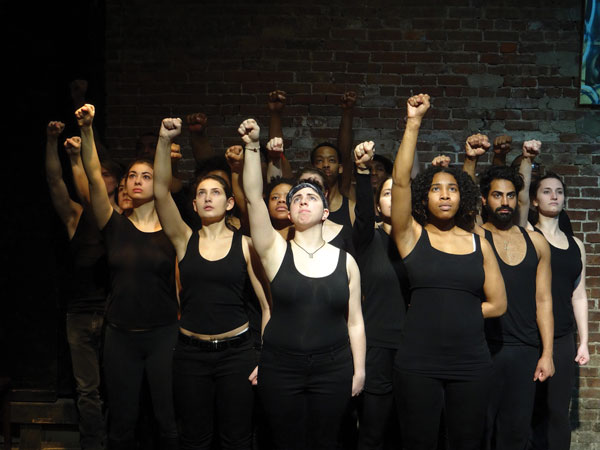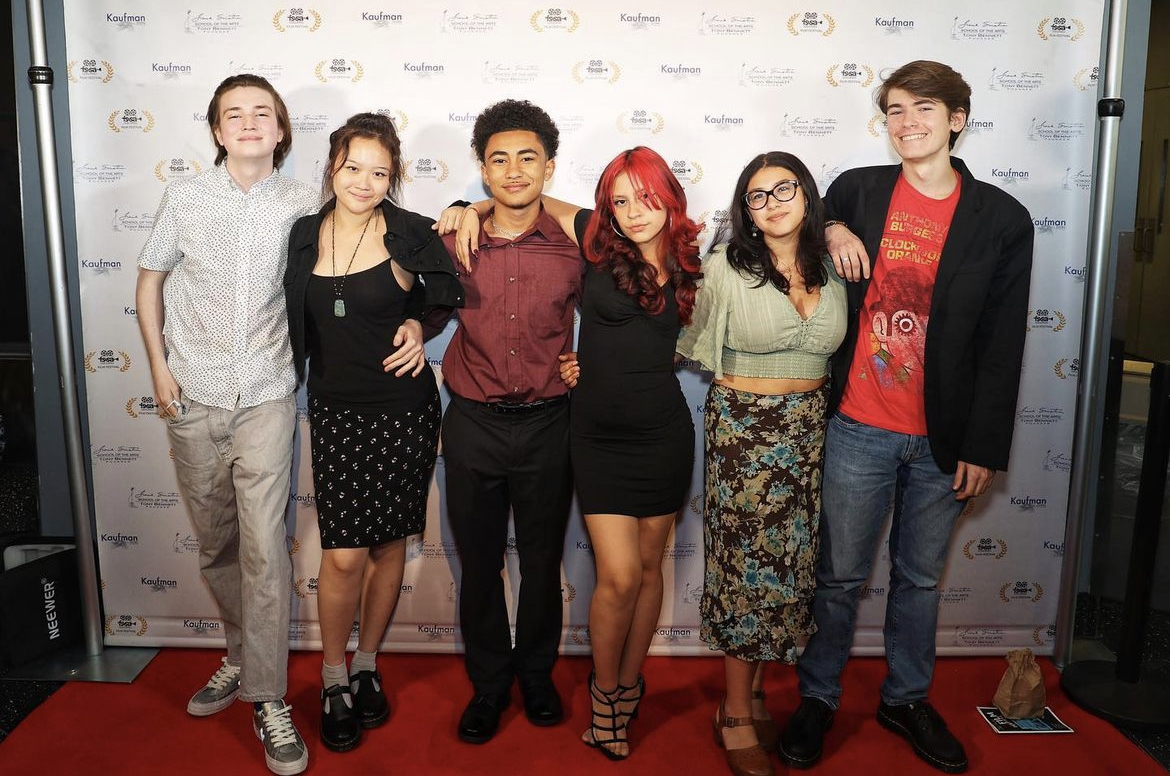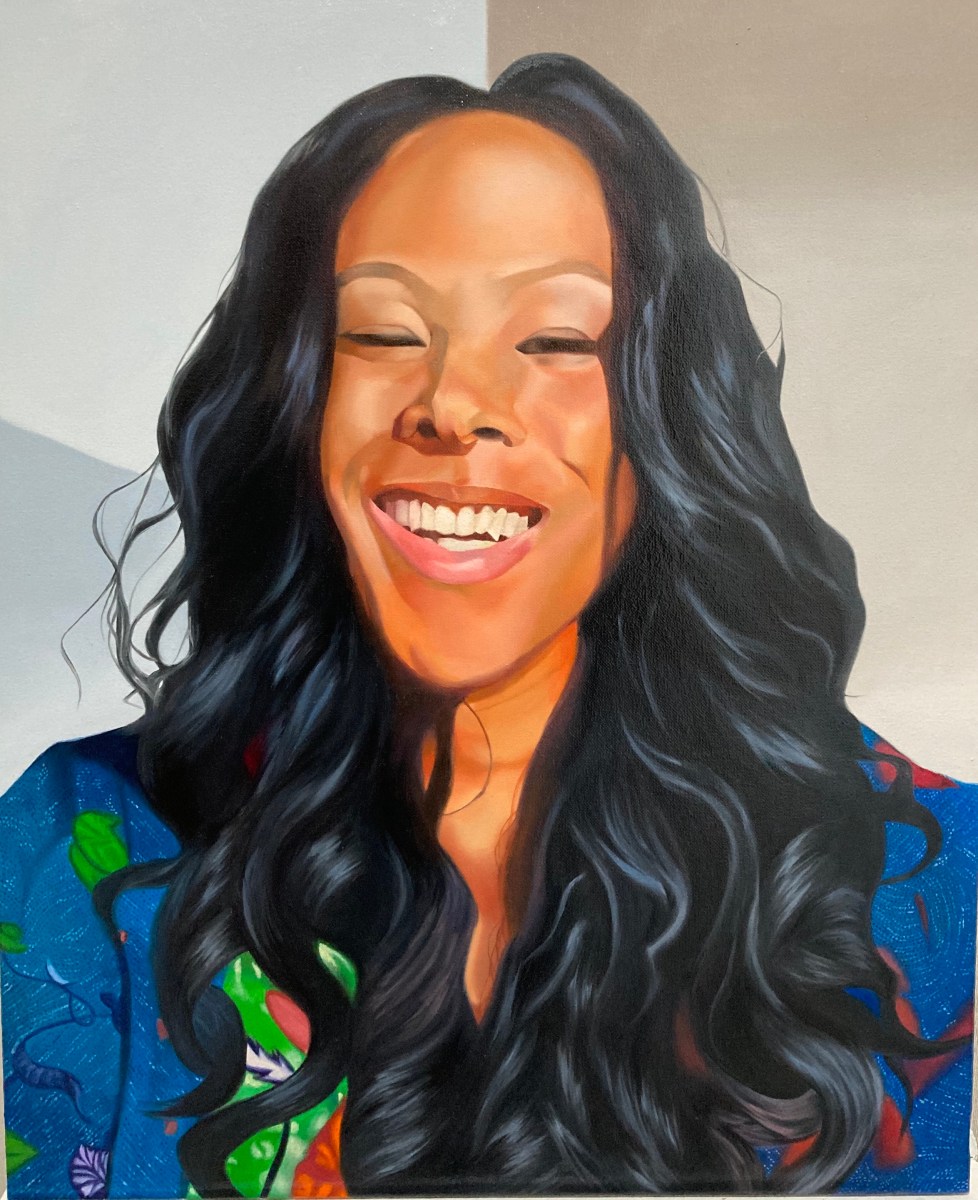 Photo by Adam Mace
Photo by Adam Mace
Come together, right now: A capable, 30+ cast gives “Othello: The Panther” its muscular kick.
BY SCOTT STIFFLER | Dressed in the common threads of the cause, fist raised and surrounded by an intense, engaged group of brothers and sisters, you feel like you’re an important part of something bigger than yourself. But beyond the surface of that determined call and response chant (“Power to the people! All the people!”), somebody’s plotting your downfall — and if they get the power, chances are it won’t be used to elevate anyone other than themselves.
It’s 1982, and we’re in Oakland, California. After sixteen years of smear campaigns, harassment, infiltration and the jailing of its leadership, the Black Panther Party for Self Defense is on the ropes. Now comes word that the Harlem chapter has been raided, along with talk that the feds are “making mighty preparation to descend on Oakland” for a similar action that will also target the group’s free clinics and breakfast programs for “heavy disruption.”
In the midst of crisis, though, there’s opportunity: Honorable Minister Ray has interrupted the group’s political education and synchronized callisthenic session to announce that good soldier Othello has been anointed to lead a defense and retaliation movement. Ordered to report to his new safe house at 7am, Othello and his new bride, Desdemona, will have a very short honeymoon. So the two lovebirds (one black, one white) retreat for a few hours alone — she, cooing Olivia Newton-John’s “Physical” and he, slow-jamming Marvin Gaye’s “Sexual Healing.”
But not everybody is singing a happy refrain. Desdemona’s would-be suitor, Rod Amigo, and her mother, Isabelle, are both locked into rage mode — and the leadership shakeup caused by Othello’s ascension puts Iago and Cassio at odds. With the movement forced underground, jealousy, ambition and love are about to do far more damage than the best efforts of the media, the feds and local law enforcement.
That’s the high-stakes plot of “Othello: The Panther” — an ambitious, charismatic and exceedingly well-done adaptation of Shakespeare’s “Othello: The Moor of Venice” that scatters its multicultural cast throughout the theater-in-the-round setting of the Nuyorican Poets Cafe. Mere feet from rubbing shoulders with them, the air crackles and the floor shakes with the coiled intensity of over two dozen Panthers ready to strike down outside aggressors or, more likely, turn on their own.
Seen by this paper for review on the night before its official February 1 premiere, co-writer and director Rajendra Ramoon Maharaj welcomed the audience with a few notes, and one disclaimer. His request to forgive common dress rehearsal gremlins such as blown lines, missed lighting cues and forced stops proved unnecessary. Every element of the production (a lean, muscular, two-plus hours) was ready for prime time — with its cast navigating the dense script (a 60/40 blend of new and old) with confidence, precision and ease (well, they made it look easy).
Maharaj was similarly upfront about the production’s desire to shift hearts and minds from viewing the Panthers as violence-prone race baiters (a false image created by the media and government, he asserts). By setting his “Othello” in the movement’s waning days, all the better to emphasize their self-determination, community activism, racial inclusion and gender equality. Truth be told, the Panthers (in any stage of their existence) could do a lot better in that last department. That much is said, and more, in a frank discussion between Desdemona and Iago’s love, Emilia (Kubbi, in a particularly nuanced performance). It’s one of the play’s best scenes, with Emilia lashing out at the “childish jealousies” that are wreaking havoc with group cohesion and domestic tranquility. “Husbands must know,” she warns, that “their wives are human too: they see and smell and have all kinds of tastes for sweet and sour, as husbands have.”
To their credit, Maharaj and his collaborators (co-writer Jonas Goslow, and assistant directors/associate producers Adam Mace and Arielle Gannon) don’t let the movement (or mankind in general) off the hook for these, and other, transgressions. Like any group of people who come together for a single purpose (whether it’s the office Secret Santa pool or a political party), interpersonal conflict is always in a land grab with the big picture goals. As for sussing out the true nature of the movement, there’s more than one play to be written about the Panther Party’s teachings and deeds. But this production, obligated as it is to follow the narrative of “Othello,” does very well by spending the lion’s share of its time exploring “the contemporary role that race plays in politics” and examining “conflicts in groups that advocate for progressive social change.” It’s a trip worth taking, as much for the performances as for the political enlightenment.
Initially written (and beautifully played) as a blissed-out hippie chick whose love revolution platitudes seem as empty as they are naive, Kaitlyn Schirard’s Desdemona quickly settles into her role as the production’s closest thing to a pure soul in possession of a solid moral core. That said, the writers (of the new stuff and the original) aren’t above taking a page from scheming Iago’s playbook, by planting seeds of doubt that grow into nagging suspicions.
Doth the lady protest too much, when her forceful advocacy on behalf of Cassio is pegged for romantic interest? Hey, if she’ll lie about that, maybe she isn’t even pregnant. And what about the erudite, physically imposing, increasingly brooding Othello? He connects the dots of history, politics, race and class with surgical precision — yet remains blind to the fact that Iago (Jonas Goslow, calculating and brilliant throughout) is feeding him cues that paint his closest allies as sinister traitors. Are we actually supposed to be rooting for this guy? For all but a few of his fellow Panthers, it’s an easy choice to follow the leader — thanks largely to the outward confidence that Kena Anae brings to his deeply conflicted Othello. When he implores his followers to remember him as “one that loved, not wisely, but too much,” we feel it.
So who’s the real villain? It’s difficult to tell — a phrase that would make a fitting epitaph for the multitude of gravestones somebody’s going to have to pay for by the end of the play. This being a Shakespearian tragedy, it’s no spoiler to note that most of the main characters, whether drawn as black, white or gray, end up meeting the business end of a dagger. Only falsely accused Cassio (Nathanial Ryan, poignant in wounded mode and even better once redeemed) lives to see another day — and instructs his Panthers to be brave, seize upon the triumphs of past deeds, and know that all who define themselves through love and sacrifice are true revolutionaries.
THEATER
OTHELLO: THE PANTHER
Presented by Rebel Theater Company,
Be. Do. Fly!, & The Nuyorican Poets Cafe
Conceived, Written & Directed by Rajendra Ramoon Maharaj
Co-Written by Jonas Goslow
Based on Shakespeare’s “Othello, the Moor of Venice”
Through Feb. 23
Thurs. & Fri. at 7pm
Sat. & Sun. at 6pm (except Feb. 23: 2pm)
At Nuyorican Poets Cafe
236 East Third Street (btw. Aves. B & C)
Tickets: $25 in advance, $30 at the door
To order, visit nuyorican.org

















